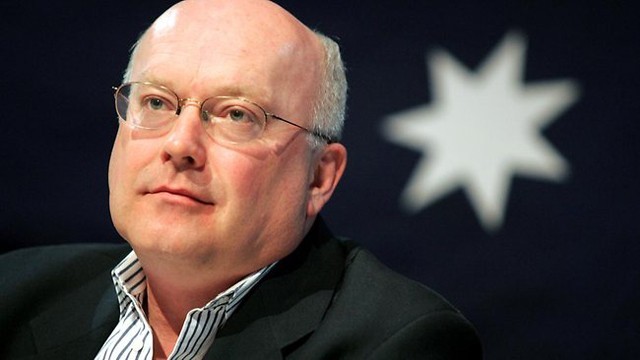A CHALLENGE to the ACT’s proposed laws to introduce same-sex marriage on constitutional grounds provides the certainty needed on an emotive issue and the guidance required for potential state-based schemes.
On Thursday, newly commissioned Attorney-General George Brandis QC announced the federal government would challenge the ACT’s Marriage Equality Bill 2013. The challenge reportedly follows advice he received last week from the commonwealth Solicitor-General that the proposal was unconstitutional.
The bill’s explanatory memorandum outlines that it is designed to “allow couples who cannot marry under the Commonwealth Marriage Act 1961 because of the way marriage is defined under the act to enter into a marriage regardless of sex”.
In practice, the bill is a mix of show-ponying by sections of the Labor Party to try to claim ownership of this social change while knowing it likely exceeds their power, as well as putting pressure on the commonwealth to follow and allow same-sex couples to marry.
Opponents of the law argue the commonwealth should seek to overturn the soon-to-be law.
Any effort to overturn the law will quickly become a de facto debate on the present federal Marriage Act and it is doubtful such a law would be passed under present Senate arrangements.
There is a certain irony to any commonwealth challenge.
Under section 51 (xxi) of the Constitution, the federal government has the “power to make laws for the peace, order and good government of the commonwealth with respect to marriage”.
The federal government has legislated that a marriage is a “union of a man and a woman to the exclusion of all others, voluntarily entered into for life”.
The ACT will likely argue that the unions they are forming don’t fit within this category, are therefore not marriages, and don’t conflict with the federal power.
Therefore the federal government will have to argue that a union between two people of the same sex is equivalent to a marriage, even though it has explicitly legislated otherwise.
But so long as the ACT seeks to define these relationships as a marriage it seems unlikely the territory will win.
The ACT may be the first cab off the rank but it is not alone. The Tasmanian parliament is set to re-debate an earlier failed move to introduce state-based marriage for same-sex couples.
The NSW parliament has also had an inquiry into whether it should legislate for a state-based scheme. A bill will be introduced and debated soon.
The NSW inquiry concluded states had “the power to legislate on the topic of marriage, including same-sex marriage”, before raising the caveat that the result of a High Court challenge was uncertain.
In any decision from the High Court, the government should also seek clarity about how the court may respond to the states taking equivalent action.
Some constitutional lawyers argue the states can establish marriages, but their interpretations appear to be based on the hope that the High Court will support the social change and ignore the jurisdictional nature of the dispute.
It is not an accident of history that Australia has uniform national marriage laws. The drafters of our Constitution learned from the US experience of leaving the definition of marriages to the states.
Despite the merits of competitive federalism, Australia’s founders made an informed decision that nationally consistent laws were desirable.
The Abbott government is seeking an expedited hearing from the court, which hopefully should avoid a repeat of the dilemma faced by California.
California issued marriages to same-sex couples following a state Supreme Court ruling in June 2008 that declared the existing ban on marriage for same-sex couples unconstitutional, and the subsequent November 2008 passage of a referendum, Proposition 8, that reinstituted the ban. Since then, legal challenges have resulted in overturning of the Californian ban. But in the six months to November 2008 more than 18,000 marriages for same-sex couples were registered.
Following the passage of Proposition 8 the legal status of those relationships sat in legal limbo. It wasn’t resolved until a 2009 California Supreme Court ruling upheld the legality of the unions of those already married. But the same rule concurrently denied other same-sex couples access to marriage, effectively creating two classes of citizens.
If the ACT or NSW issues a single marriage certificate to a same-sex couple, and a subsequent constitutional challenge is successful, the cruel process of removing the legitimacy of a couple’s relationship in the eyes of the law will be a reward for only the most heartless opponents of change.
These sentiments were echoed in the Attorney-General’s statement: “It would be very distressing to individuals who may enter into a ceremony of marriage under the new ACT law, and to their families, to find that their marriages were invalid.”
A commonwealth challenge to the ACT plan won’t satisfy those who want to use the debate solely for political grandstanding, but it will provide the clearest and fairest pathway for supporters and opponents alike.
Even if the commonwealth does not challenge the ACT’s plans, opponents will. A commonwealth challenge gives it the best chance to be debated on constitutional grounds, without prejudice on the preference for an outcome in favour or against, but merely in favour of clarity.
Tim Wilson is a policy director at the Institute of Public Affairs.
Author: Tim Wilson
Publication: The Australian
Date; 12 October 2013

